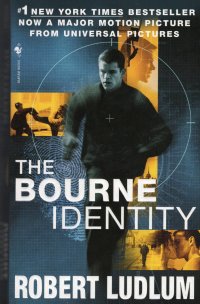 When I bought this book in 2018, I mentioned that my beautiful wife loved the books. To prove her point, she recently re-read this book (not this copy, which is mine, but her copy which is a well-re-read hardback). So when I was looking for another “short” book to read in between chapters of C.S. Lewis’s Perelandria (which has been very, very slow to start), I settled upon this paperback which has images from the Matt Damon movie on the cover. Judging by the uncracked binding, this book was not read and re-read by its original owner. I also mentioned when I bought the book that I had listened to one of the original books on audiocassettes back when I was commuting a lot to Columbia, Missouri, and back. But I was not familiar with the way the book began, so I think it might have been The Bourne Supremacy.
When I bought this book in 2018, I mentioned that my beautiful wife loved the books. To prove her point, she recently re-read this book (not this copy, which is mine, but her copy which is a well-re-read hardback). So when I was looking for another “short” book to read in between chapters of C.S. Lewis’s Perelandria (which has been very, very slow to start), I settled upon this paperback which has images from the Matt Damon movie on the cover. Judging by the uncracked binding, this book was not read and re-read by its original owner. I also mentioned when I bought the book that I had listened to one of the original books on audiocassettes back when I was commuting a lot to Columbia, Missouri, and back. But I was not familiar with the way the book began, so I think it might have been The Bourne Supremacy.
So: Well, this certainly is the longest Executioner book I’ve ever read.
This is the first of the Bourne series, and it starts with an unnamed man get thrown into the Mediterranean Sea just before a boat explodes. He is recovered by fishermen and is nursed back to health by an alcoholic doctor. But he has amnesia and does not know who he is. The doctor finds a piece of microfilm on him that gives him a way to access money from a Swiss bank. When he’s feeling well enough, he goes to Zurich to claim the money and finds that some people want to kill him. He hooks up with a Canadian economist who helps him, and his memory comes back in plot-helpful fits and starts. He might be a killer named Cain! He might be Carlos, the most notorious assassin in Europe! He might not even be named Jason Bourne! Set pieces, he plays cat and mouse with Carlos’s employees, and then suddenly a black ops organization in the United States government wants to pull him in, and the book pivots to him running from them, and….
Well, meh.
I mean, it’s awful damn wordy. We get pages of different players talking to each other to lay out plot points or to speculate on plot point to somehow build tension through gasbaggery. I complained about the same thing in Shōgun. And then we get the protagonist wigging out when memories and sensations coming flooding back. A bit overused and overdramatic.
I mean, it’s a long book, but the writing is not especially deep with description or characterization, although modern thrillers I’ve read like Lee Child tend to be thicker writing but not any more real depth to it, just words. Somewhere there’s a sweet spot, and I probably don’t write that way myself. Probably because the same voice critical of these books is critical of my writing while I’m writing. “How’s that next novel coming?” you might ask. It is not, thanks.
But I read one of my mother-in-law’s favorite books this year (A Tale of Two Cities), and I slagged on it. Now I’m slagging on one of my wife’s favorite books. Maybe I just don’t have anything nice to say about anything. But that’s what bloggers are, ainna?


